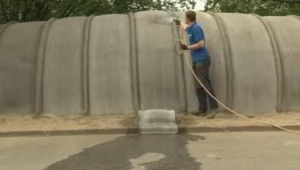Pakistan-China: “We have asked our Chinese brothers to please build a naval base at Gwadar,” Chaudhary Ahmed Mukhtar, Pakistan's Defence Minister, told the Times.
However, a Chinese Foreign Ministry spokesman said that China is unaware of the proposal by Pakistan to build a naval port at the deep-water port of Gwadar. The issue was not discussed during Pakistani Prime Minister Gilani's visit to China last week, the spokesman said.
Comment: Defence Minister Mukhtar did not say when Pakistan asked the Chinese to build a base at Gwadar. In fact, construction of a naval facility has been part of the plans for Gwadar since the early 1990's.
Forty years ago, Gwadar, on the coast of Baluchistan Province and 47 miles east of the Iranian border, was a fishing village with a small port in a sheltered, deep water natural harbor with two bays. In the 1971 War, Pakistan Navy surface ships deployed from Karachi to Gwadar to avoid destruction by the Indian Navy.
Since 1993 Pakistani governments have worked to develop Gwadar as a planned, modern, deep water port and city, as well as a “sensitive defense zone.” The primary investors in the port, adjacent road and rail infrastructure and planned city of Gwadar have been China and the government of Pakistan. Construction on the highway link to Karachi and on the port began in 2002. The port was inaugurated officially in 2007 by General Musharraf. It received its first maritime ship, carrying a cargo of wheat from Canada, in 2008. The Port of Singapore Authority has the administration contract.
The 50-year master plan calls for Gwadar to develop into a major economic hub in the Arabian Sea for energy, oil tankers and deep-draft container shipping and ship building and to be the location of a main naval base for the Pakistan Navy. For China, Gwadar port will be one of three in the Indian Ocean that will have overland links to western or southwestern China that will enable it to avoid relying on the Straits of Malacca and Singapore for shipment of strategic raw materials. The other two are Chahbahar, Iran, and Kyauk Phyu, Burma.
In an interview broadcast on 24 May about the Karachi terrorist attack, Pakistan Chief of Naval Staff Admiral N. Bashir explained, “When the navy created the Karsaz Establishment in the Karsaz area, it was outside the city (Karachi). Now it has become a part of the city center. Similarly, when this base was established, the Faisal Town built up on the backside did not exist. I have been trying for the past three years to relocate from the area. The government has supported us on this. Our major naval base is under construction, far from Karachi…. We are aiming to minimize our presence in Karachi.”
The Admiral was referring to Gwadar. The Chinese are the primary builders of the port, so it is almost certain that they are building the naval base, though security considerations would prevent them from admitting it in public.
News reports over the weekend suggested that the Chinese were building a base for the Chinese navy. Those mischaracterized this long time project. Chinese naval ships will call at Gwadar when the base is complete, as they do at Karachi. However, the base will be a Pakistan Navy base.
Chinese involvement at Gwadar is not news, but it is part of a sophisticated, long term strategic plan.
NIGHTWATCH KGS Home
Phi Beta Iota: While the US Government antagonizes Pakistan and fails in Afghanistan, China in Pakistan (and Iran and Turkey elsewhere) are steadily making substantive gains by waging peace with construction. They are a study in 21st Century strategic sensibility grounded in reality–the USG (not to be confused with the US public) is a failure in this context–a dangerous expensive failure.





